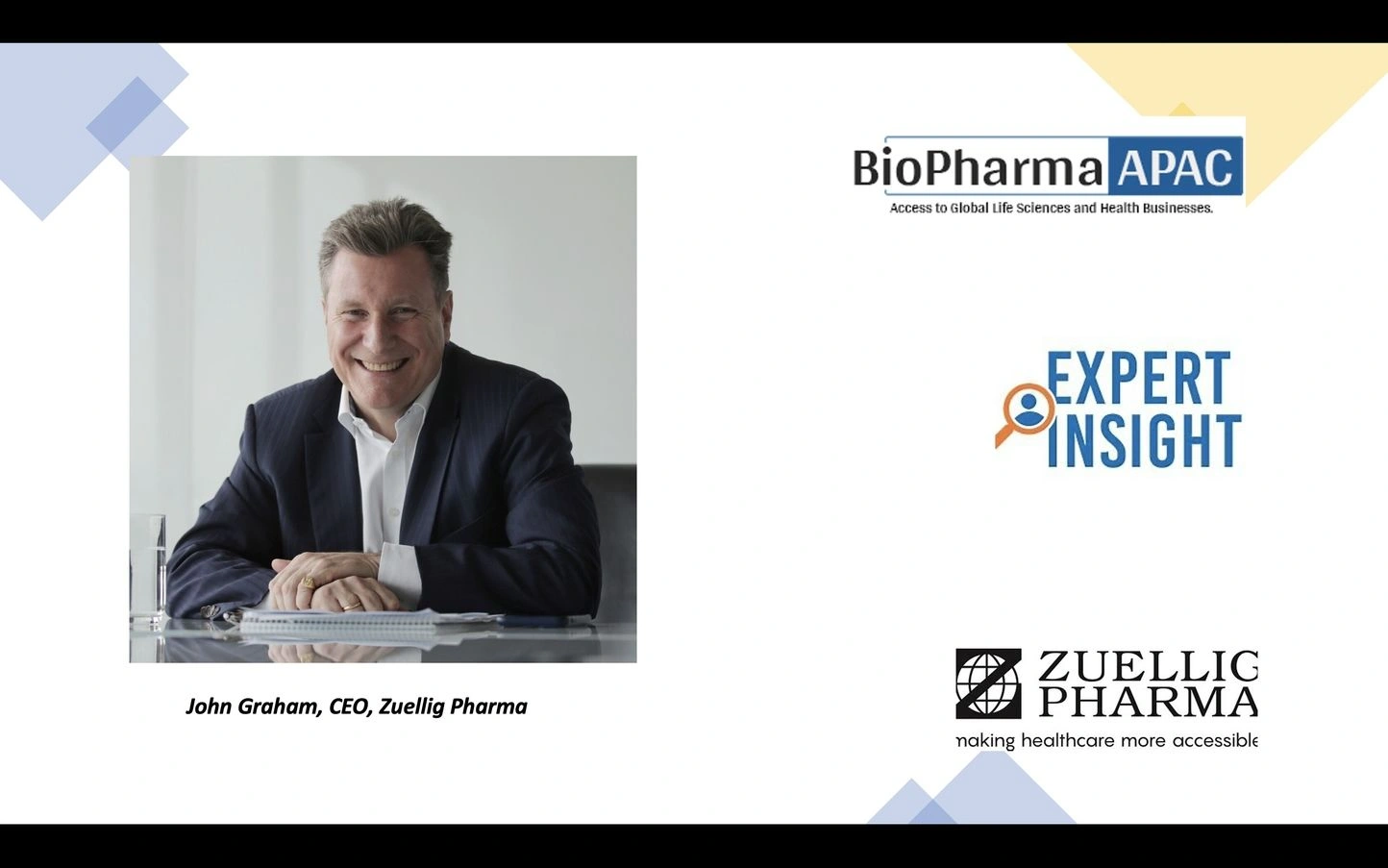In a compelling interview with BioPharma APAC, John Graham, the CEO of Zuellig Pharma, delves into the dynamic landscape of healthcare. With a focus on emerging trends, sustainability, and the intricate navigation of global challenges, this discussion offers valuable insights from a prominent leader in the pharmaceutical and healthcare sectors. Join us as we explore the intersection of healthcare innovation, environmental responsibility, and Zuellig Pharma's commitment to addressing pressing healthcare needs in Asia.

Can you elaborate on the evolving trends in the healthcare industry, and how factors such as technology, innovative product portfolios, and changing consumer priorities are shaping the industry's landscape?
We’re seeing a definite shift in the biopharmaceutical space, especially with the demand for more innovative forms of healthcare to treat existing and emerging disease areas. Alongside the technological advancement, the healthcare industry has to keep up with evolving expectations of consumers who are placing greater priority on personal wellness and tailored experiences.
There has also been an increased emphasis in ensuring healthcare access and equity in the region and globally. Rising inequality in Asia, the impact climate change will have on population health and geopolitical headwinds are all issues that will pose challenges to the future of healthcare.
Ensuring that quality healthcare remains affordable and accessible for both developed and developing markets, while mitigating the knock-on effects the industry has on the environment will create a greater need for the industry to look towards greener practices in its operations.
With increasing concerns about climate change and sustainability, how is Zuellig Pharma addressing the call for the healthcare industry to prioritise sustainability? What specific initiatives or strategies has the company undertaken to reduce its carbon footprint and promote sustainability within the healthcare sector?
The environmental impact of the pharmaceutical lifecycle, from drug development to transport, distribution and disposal has long been a pain point for the industry.
As a leading healthcare solutions company, we recognise the need to introduce sustainable solutions while at the same time ensure that we are constantly working towards making healthcare more accessible for communities in Asia. This includes embedding sustainable solutions throughout different parts of our business, including the use of renewable energy, electric vehicles and the use of transport management systems to operate more sustainably in more complex logistics networks.
We’ve reduced our Scope 1 and 2 emissions by 42% since 2021, with the goal of being carbon neutral by 2030, and have taken active steps towards greening our fleets and facilities, including the modernisation of our vehicles with new technologies to capture emissions and use fuel more efficiently. We also use electricity powered equipment in our warehouses and have moved most of our regional services from on-premises hosting to cloud-based data centres.
Zuellig Pharma also recognises that there is a need for players across the value chain to work together to promote sustainability across operations. This is why we also prioritise working with suppliers who demonstrate their progress and ability to reduce their carbon footprint, and why we have started to incorporate sustainability criteria within our supplier selection and contracts so that we can align with partners to achieve our carbon reduction targets.
In light of your extensive experience in the pharmaceutical and healthcare sectors, what steps do you believe pharmaceutical and healthcare organisations can take to enhance access to healthcare while also introducing more sustainable practices? Are there any successful case studies or approaches that you can highlight?
Having a strong vision and a clear direction for sustainability goals should be one of the defining pillars of any organisation’s strategy to maximise the positive impact it can bring to stakeholders, communities and the planet.
For healthcare organisations in particular, it is important that such a vision encompasses a multi-faceted approach to sustainability. Sustainability has never been a one-dimensional issue, and organisational strategy should reflect this accordingly.
It is also important to work closely with likeminded organisations to ensure that these goals can be made a reality. Prioritising sustainable procurement processes across the supply chain, and working towards meeting compliance with sustainability regulations are all ways in which companies can deliver real, tangible impact in the industry.
Investing in the right technology and solutions to make operations more sustainable is also another way in which companies can introduce more sustainable practices. For example, we introduced a sophisticated packaging solution – eZCooler, to significantly extend the storage time of temperature-sensitive products using a unique thermal isolation system that is both reusable and 100% recyclable, without relying on external energy sources. This proved to be instrumental during the height of the COVID-19 pandemic, where cold-chain solutions coming to the forefront as vaccines urgently needed to be delivered to communities all around Asia.
Zuellig Pharma has a long history in Asia, and you've been at the helm as CEO since 2020. Could you share some insights into the company's evolving journey and its commitment to furthering access to healthcare for the Asian population through climate-conscious means? What milestones or achievements are you particularly proud of in this regard?
Since 2016, we’ve set out to embed sustainability into every facet of our operations at Zuellig Pharma, adhering to a sustainability framework that is guided by four key themes – Setting the Highest Standards of Integrity, Nurturing Talent, Improving Health Outcomes and Respecting the Environment.
To date, we have been awarded the Platinum medal by sustainability ratings specialist EcoVadis for the third year in a row. The award is the highest accolade to be awarded to a company for its sustainability efforts and positions Zuellig Pharma in the top 1% of all assessed companies worldwide, scoring above industry averages for all pillars.
We have also rigorously improved our sustainability initiatives year-on-year in order to continue driving impact for our stakeholders, using rigorous ESG metrics and developing action plans to address the gaps identified in previous assessments. We are one of more than 4,000 companies across the globe to have our targets approved by Science Based Target Initiatives (SBTi), in line with our commitment to reduce direct and indirect Greenhouse Gas (GHG) emissions across our operations by 42% and reducing GHG emissions across our supply chains by 25% by 2030.
In 2023, we were also awarded the highest score obtained in our activity group from the international non-profit organisation Carbon Disclosure Protocol (CDP). This represents the second highest level of maturity a company can reach, and ranks us above the Asia average, Global average, and Road Transport average.
These accolades are testament to how sustainability remains fundamental to our business, and how we’ve steadily worked towards the long-term goals we’ve set out for the organisation.
The COVID-19 pandemic has brought unprecedented challenges to the healthcare industry. How has Zuellig Pharma navigated these challenges, and what lessons have you learned in terms of adapting to unforeseen global crises and maintaining the supply chain for critical healthcare products?
COVID-19 revealed the vulnerabilities in supply chains, with countries and businesses battling to manage massive disruptions. Geopolitical and macroeconomic headwinds have also resulted in a slowing of global growth, which has had effects on diverging supply chains.
Asia’s diverse and fragmented market with varying regulatory standards and large rural communities has further underscored the need for supply chain resilience, to ensure that access to healthcare and life-saving medicines are not crippled by sudden supply or demand spikes.
During the pandemic, our existing strong partnerships with manufacturers, governments, regulatory bodies, international organisations and the private sector enabled us to accelerate COVID-19 vaccination roll-outs, whilst maintaining access to healthcare. Zuellig Pharma supported access to over 150 million COVID-19 vaccine doses across Asia, engaging over 400 government stakeholders across the globe to carve out vaccine stock allocation to Asia.
We believe that building good, reliable distribution networks through public-private partnerships will continue to be essential to healthcare delivery, and working with local governments and cross-sector authorities will ensure that the delivery of drugs can be maintained even amidst the most turbulent times.
On top of this, it is also important that industry players develop innovative solutions that prioritise patient care, education and affordability through strategic collaborations. Initiatives such as end-to-end vaccination programmes, named patient programmes and enhanced disease awareness and management, which are part of Zuellig Pharma’s Patient Care solutions, will only be possible through a multi-stakeholder approach. By working collaboratively with authorities towards the shared goal of strengthening health systems and finding more opportunities for convergence and partnership, the industry can be prepared to operate through and beyond the next global crisis.
Given the geopolitical tensions and macroeconomic headwinds in the region, what strategies has Zuellig Pharma employed to ensure its business resilience and continued growth in such a dynamic and potentially volatile environment?
As a business that has been operating for more than a century, we have deep expertise and knowledge of healthcare systems and the landscape in Asia, which has enabled us to develop and refine best-in-class innovative solutions that expand access to healthcare for the markets we operate in.
As we continue to develop new innovative solutions to address Asia’s unmet healthcare needs, we will continue to modernise our supply chain infrastructure and develop unique data and analytics offerings that help our clients and customers improve product and care delivery for patients.
We are also working to accelerate our digital capabilities by developing omnichannel platforms, new digital engagement tools with healthcare professionals and technology that can help to accelerate growth and efficiencies within the business.
Most importantly, we will continue to drive sustainability efforts to ensure that our growth is both sustainable and climate conscious, so that we can make good on our commitment to the communities we serve and the world we live in.
